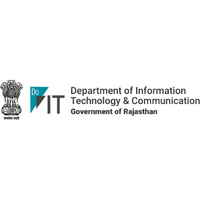
Government Of Rajasthan
View Brand PublisherRajasthan government launches IT learning centre R-CAT to promote youth employability in the sector
Through the brand new Rajiv Gandhi Centre of Advanced Technology (R-CAT), the Rajasthan government will train tech graduates in a number of technical and soft skills to help bridge the gap between learning and application of technology.
Rajasthan Chief Minister Ashok Gehlot launched the Rajiv Gandhi Centre of Advanced Technology (R-CAT) in Jaipur on August 20, 2022 on the sidelines of the DigiFest 2022, as part of the government’s ongoing efforts to promote information technology (IT) as the industry of choice for the state’s graduates.
Recognising the potential for the growth of Rajasthan’s IT industry and startups, R-CAT was announced in the government’s state budget (FY 2021-22), under the management of the Department of Information Technology and Communication (DoIT&C).
The main objective of R-CAT is to train fresh tech graduates in certificate courses from partners such as Oracle, SAS India, VMware, Red Hat, and Autofina Robotics, across disciplines such as artificial intelligence (AI), machine learning (ML), robotics, blockchain (Web3), augmented reality (AR), virtual reality (VR), quantum computing, and more. It will also train students in soft skills required for employability.
The centre will, in essence, function as a finishing school for Rajasthan’s students to bridge the gap between learning and application of technology, ensuring the students are equipped with all the skills necessary to make them industry ready.
Named in honour of late former Prime Minister Rajiv Gandhi — who was known for modernising IT and communications across the country — R-CAT will also provide research opportunities to the youth, that will help students learn about and explore cutting edge technologies and the latest IT developments. At its state-of-the-art campus on Tonk Road, R-CAT’s infrastructure includes classrooms, working spaces for groups as well as individuals, smart classrooms, a conference room, and a robotics lab.
“The students who come to this centre will be able to study advanced courses, increasing their employability. This will help the development of human resources in the IT sector,” Chief Minister Gehlot said at the inauguration, adding in a separate statement, “We firmly believe that by undergoing training on advanced and emerging technologies at the centre, through industrial leaders, the youth of the state would be able to become job ready and industry acceptable.”
Beneficiaries of the centre’s courses say that the programs greatly help startups and are especially helpful for youth and entrepreneurs. Anshul Goyal, Director of Rajasthan-based startup Wellforia Marketing Private Ltd, who completed the SAS Certified Specialist (Base SAS Programming & Visual Analytics) course at R-CAT recently, said, “The infrastructure of the R-CAT centre is great and even the faculty was very good. The course was rigorous, and very practical focussed more than theoretical so that helps with real-world experience. The course curriculum also was good.”
Manish Kumar, founder of full-stack animal husbandry platform Verdant Impact, also said that the R-CAT training programs helped him refine his company’s business model. “At R-CAT we attended C4C (cloud for customer) and Business Analytics programs. Through these various sessions we were able to refine our business strategy and go-to-market model, as well as learned about SAS Enterprise Miner.”
Also speaking at R-CAT’s launch, Akhil Arora (IAS), Principal Secretary to the Government of Rajasthan, DoIT&C, said, “After the COVID-19 pandemic, everyone knew without a doubt that this is the era of technology, and specifically of information technology. At first, everyone thought that IT was meant for only the highly educated, or only for the urban population. But thanks to the chief minister’s many initiatives, it has been proven that no matter whether you’re from a village or an urban area, a child or an elderly person, rich or poor, IT is essential for everyone.”







